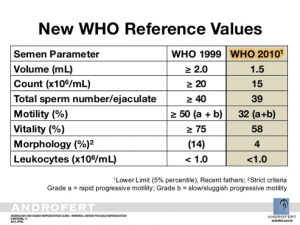Acupuncture and Male Fertility
Men’s health is equally important and imperative to fertility as women’s health.
“Infertility affects an estimated 15% of couples globally, amounting to 48.5 million couples. Males are found to be solely responsible for 20-30% of infertility cases and contribute to 50% of cases overall.”
Male factor accounts for 1/2 of cases of infertility.
While acupuncture is commonly understood to be a form of fertility treatment for women, it is equally important to consider the role acupuncture can play in supporting fertility through the improvement of sperm quality in men. Regular acupuncture can greatly improve sperm quality and can increase the chance of success for couples trying to conceive.
Why is sperm health so important?
Fertilization
Both the motility (movement/ability to swim) and morphology (shape) of the sperm are important for natural conception and fertilization because the cervix is designed to weed out any “bad” sperm. Normal morphology allows the sperm to swim in a straight direction and towards the goal. Motility allows them to have even propelling power to make it all the way to the egg. Sperm swim on average 3 mm per minute and it takes them about an hour and a half to reach the egg.5
Very early embryo development
Genetic material of sperm is responsible for days 3 to 5 of blastocyst (fertilized egg) development. Once fertilization occurs, the first three days of embryo development rely on the eggs’ genetic material. After day 3 the sperm’s genetics begin to contribute. Healthy blastocyst development relies a lot on good genetic material from the sperm. Abnormalities in sperm DNA are also associated with fertilization failure, post-implantation loss and poorer childhood health.5
Sperm quality is essential to strong sperm DNA
Higher levels of DNA fragmentation (damage to DNA within sperm) are associated with higher chances of early pregnancy loss. They found that couples affected by recurrent pregnancy loss had twice as much sperm DNA damage compared with the unaffected men. Men whose partners had suffered miscarriage also had a four-fold increase in the amount of reactive oxygen species compared with unaffected men.
Sperm counts are on the decline
In the last 30 years, sperm quality has dropped by 50%. In 2010, the World Health Organization (WHO) had to lower the standard values of a semen analysis because there has been such a huge, overall decrease in sperm numbers.

(Source: https://www.slideshare.net/sandroesteves/abnormal-semen-parameters-what-doctors-should-know)
How can acupuncture help?
Acupuncture can help increase sperm count, motility and quality. It does this by increasing blood circulation and nerve conduction to the gonads, which, in turn, aids in spermatogenesis, hormone signalling, and temperature regulation.
Acupuncture works slowly and cumulatively, so regularity and consistency of appointments is very important. Spermatogenesis (the body’s process of making sperm) takes 2 to 3 months, so it is important to receive acupuncture for at least 2 to 3 months to expect a significant change in sperm quality.
Consistency of acupuncture treatments is also key because our bodies respond to acupuncture treatments the way we respond to physical exercise. For example, working out once a month is good for you, but if you want to get stronger, you need to exercise frequently and consistently.
A 2005 study published in Fertility and Sterility measured 28 men with low sperm count, poor motility and poor morphology who received acupuncture twice a week over the course of five weeks. Statistical evaluation of the data showed significant increase in normal sperm morphology and total motility in the group receiving acupuncture compared to the men who did not receive acupuncture.
The study concludes that acupuncture treatment is a simple, non-invasive method that can improve sperm quality, and when used in conjunction with ART, fertility potential is further improved.5
A 2017 study in Human Reproductive Update showed that sperm quality also increased in males with subfertility related to low sperm count after acupuncture treatments. In this study, 16 subfertile patients were analyzed one month before and after acupuncture treatment at a treatment frequency of twice a week for five weeks.
The study found a significant increase in total functional sperm and an improvement in sperm motility, which suggests patients with reduced sperm activity may benefit from acupuncture treatment.6
To learn more click here
What can I do?
In addition to regular acupuncture treatments, a healthy diet, supplements, and lifestyle choices can all play a role in the improvement of sperm quality. Here is a list of recommendations you can incorporate into your daily life to support your acupuncture treatments.
Diet
A good diet is essential for healthy sperm development!
Avoid processed foods and eat a healthy diet of whole foods. Choose organic varieties whenever possible and incorporate healthy fats such as olive oil, avocado, nuts and seeds to improve sperm quality and quantity. Walnuts are rich in omega 3 fatty acids and can increase sperm production. Pumpkin seeds are high in zinc and can play a role in healthy sperm development and testosterone production.
Increase dark leafy greens, fruits and vegetables. Tomatoes are high in the antioxidant lycopene and can have a positive impact on male fertility. Blueberries are also another great option and are an antioxidant power house. Aim for at least five servings of fresh fruits and vegetables per day.
Drink plenty of water. Avoid plastic water bottles as they can leech plastics into the water that may inhibit the endocrine system. Choose glass or stainless steel whenever possible.
Supplements:
Taking a high-quality multivitamin such as Mito – Motile is also beneficial for healthy sperm production. Mito-Motile is a comprehensive blend of antioxidants and nutrients to support mitochondrial function in sperm, shown to optimize sperm maturation, count, and motility. Active antioxidant vitamins and minerals in this supplement include:
-
- Zinc: Zinc plays an important role in male reproduction. A lack of zinc can affect normal sperm production. Zinc supplements may raise testosterone levels and increase sperm production in men with low testosterone.

- Selenium: Selenium has been shown to significantly increase sperm motility.
- Folate: Folic acid is important in the development of normal sperm and acts as an antioxidant.
- Vitamins C, D and E: Vitamins C and E also function as an antioxidant and can prevent free radicals from damaging sperm cells.
- Ubiquinol/CoQ10:Ubiquinol is the active form of coenzyme q10. Multiple studies have shown that it improves both egg and sperm health.
- EPA/DHA: A fish oil supplement that includes two grams of EPA and DHA may also increase sperm count.
- Zinc: Zinc plays an important role in male reproduction. A lack of zinc can affect normal sperm production. Zinc supplements may raise testosterone levels and increase sperm production in men with low testosterone.
Lifestyle
Finally, there are several lifestyle factors to consider when aiming to improve sperm quality.
Avoid excessive heat or pressure that can raise testicular temperature including saunas, hot tubs, cycling, and hot yoga, as heat can damage sperm.
Limit coffee to one to two cups a day and limit alcohol to two ounces per week. Alcohol is a male reproductive toxin that is associated with a decrease in percentages of normal sperm.
Do not smoke or use any recreational drugs. Marijuana and other recreational drugs can stay in the testes for over two weeks. THC interferes with sperm being able to bind and fertilize the egg. Smoking increases free radical damage in the body.
Maintain a healthy body weight and exercise regularly. Excessive body weight can decrease testosterone levels and have a negative impact on sperm production.
Sleep eight to nine hours per night. Adequate sleep can improve mood, decrease stress, and have a positive effect on sex hormones and sperm production.
Book your appointment with us today
References
1) Agarwal, A., Mulgund, A., Hamada, A., & Chyatte, M. R. (2015). A unique view on male infertility around the globe. Reproductive Biology and Endocrinology, 37(13), 1-9. Published online 2015 Apr 26. doi: 10.1186/s12958-015-0032-1
2) The Endocrine Society. (2019, March 23). Sperm DNA damage may contribute to repeated miscarriages. ScienceDaily. Retrieved September 2, 2020 from www.sciencedaily.com/releases/2019/03/190323145146.htm
3) Esteves, S. (2014). Reproductive Andrology Surgery Workshop, 2014. Abnormal semen parameters: What doctors should know. Retrieved from: https://www.slideshare.net/sandroesteves/abnormal-semen-parameters-what-doctors-should-know
4) Pei, J. Strehler, E., Noss, U., Abt, M., Piomboni, P., Baccetti, B., & Sterzik., K. (2005). Quantitative evaluation of spermatozoa ultrastructure after acupuncture treatment for idiopathic male infertility. Fertility and Sterility, 84(1), 141–147. Retrieved from http://www.fertstert.org/article/S0015-0282(05)00591-1/pdf
5) Krammer-Pojer, O. (Feb. 2020). “Male Fertility Treatment with Chinese Medicine”. Healthy Seminars. Retrieved from https://healthyseminars.com/course/spermageddon-male-fertility-treatment-chinese-medicine-distance-education
6) Levine, H., Jorgensen, N., & Martino-Andrade, A. (2017). Temporal trends in sperm count: a systematic review and meta-analysis. Human Reproductive Update, 23(6), 646–659.
7) Siterman, S., Eltes, F., Wolfson, W., Zabludovsky, N., & Bartoov, B. (1997). Effect of acupuncture on sperm parameters of males suffering from subfertility related to low sperm quality. Arch Androl, 39, 155-61.

